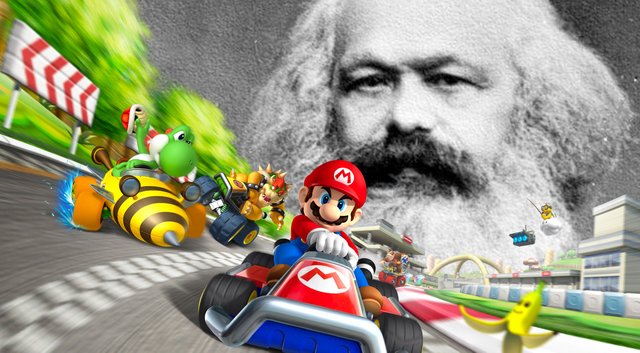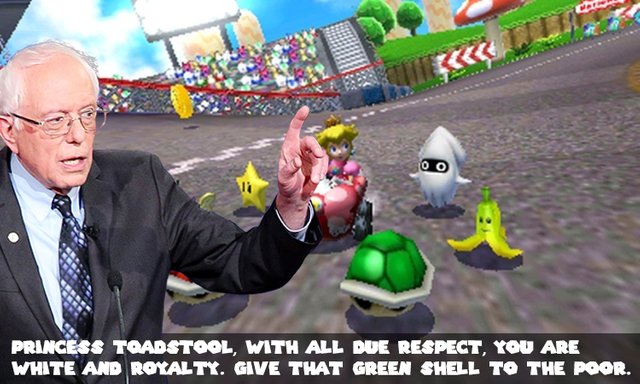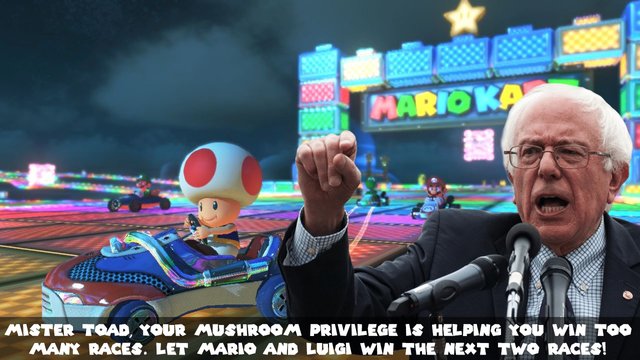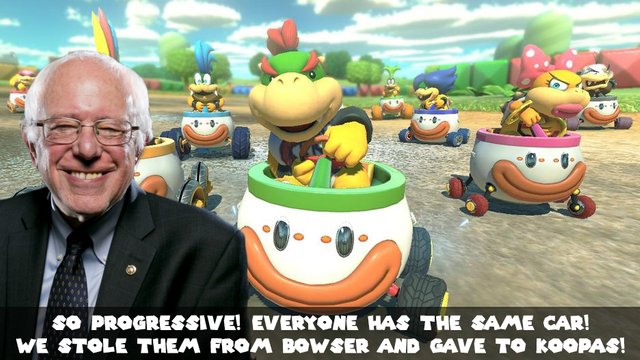Capitalism: A Game of Mario Kart

Mario Kart is a racing game developed by Nintendo where cheating is integral. You absolutely cannot win without throwing everything and the kitchen sink at your opponents. From red shells to banana peels, players bulldoze their way to victory abusing items that hinder their opponents.
You can hit your racing buddies with bombs, shells, and banana peels. A shell to the rear flips over an opponent’s kart, stopping them from driving for seconds.
Mario Kart racing is a free-for-all brawl, but nobody can argue it’s an unfair game. Even though you cannot win without using abusive items, everyone has access to these same items. The game is symmetrical, everyone plays by the same rules.

Mario Kart racing is a free-for-all brawl, but nobody can argue it's an unfair game. The game is symmetrical, everyone plays by the same rules.
The economic game has rules that work the same for everyone. Sure, everybody depends on randomly generated resources to win races, but we all play the same game.
You're not cheating in Mario Kart when you abuse items to win races, because every racer has the chance to draw the same items. You also can't win a race throwing shells at people, you have to be a good driver.
Free market capitalism doesn't guarantee that you win. It guarantees a game where you have a chance at winning. But in every race, there are countless players who fail. Politicians and activists look at these asymmetrical results that different players are getting and treating it as a problem.
Our political elite started rigging the race to "reduce inequality". We went from supporting individual rights to supporting group rights. We went from supporting equality of opportunity to equality of outcome. Our highest moral value is no longer freedom. We embrace equality, the elimination of competition.

Ever since western societies started embracing socialist ideals of equality, we’ve gotten into more and more trouble. We started introducing asymmetrical laws and social rules that treat people differently based on which group they belong to. We now see this morality applied to justify censorship, racism towards ethnic majorities, political terrorism, mob violence, etc.
Socialism proposes that economic inequality between groups is immoral. On Mario Kart terms, we are equipping players who are losing the race with extra shells, while taking away items from the consistent winners. The incentives are backwards.
Reducing inequality between groups is supposed to make life better for people in poverty. But we have evidence to suggest that giving free resources to poor people is having the exact opposite effect than empowering families to improve their standard of living.
For a game to be moral, we need the rules to be simple, consistent, and few. You cannot have exceptions to those rules. A simple moral system is superior to a complex system because it’s easy for everyone to follow. It’s easy to determine who is playing fair.
Simple morals are easy to socially enforce in our everyday interactions.
If we want to make everyone winners regardless of their skills and resources, the rules get complicated. You have to micromanage the race track and the players to ensure the wanted outcomes occur. In such a complex game, we’ll always be questioning whether the game is fair. It’s difficult to respect the winners of a complicated game. In a socialist system the winners are not respected, but demonized. The more you’re winning, the more you are punished for winning. Your property is forcibly confiscated and given to others.

Group rights are immoral because they produce asymmetrical rules. The beauty and inherent morality of individual rights is that they are symmetrical, and universal.
Everyone is an individual, ergo, everyone has the same rights.
Socialism is an immoral system because the rules change depending on your gender, your sex, your race, your income level. Protected groups gain special privileges, such as lowered taxes and protections from discrimination. The problem is that the system gets very damn complicated. Complexity leaves room for exploitation of loopholes.
A complicated moral system translated into law becomes a system riddled with exceptions. While the rules may protect people justly in some cases, people from protected groups are also incentivized to fabricate the conditions that trigger these exceptional rules. Walk into a Starbucks as a black man, cause a ruckus and pull the race card. If you can sue a company for racial discrimination, you can win the jackpot of up to $200000.
Every case where rules are successfully abused erodes people’s respect for the system. Who wants to play Mario Kart if there’s even a single player that’s cheating?
The economy should be so simple that even the less educated, less intelligent individuals can successfully run businesses. In socialism, bureaucrasy is abundant and taxes are complicated. The government creates pitfalls for aspiring entrepreneurs. Regulations, while well-intended, directly reduce the numbers of companies in every industry.
More regulations lead to less competition, more monopolization, more corruption, more problems.
The taxation system needs to be streamlined, and regulations kept to the minimum. Making the game easy to pick up and hard to master is how you make a game that people enjoy.
More free market gaming content on http://hentaireviews.moe
Sources:
https://www.dailysignal.com/2016/03/29/how-liberal-policies-destroyed-black-families/
http://blackdemographics.com/households/poverty/
https://www.ncbi.nlm.nih.gov/pmc/articles/PMC5300078/
https://www.entrepreneur.com/article/230727
https://www.businessinsider.com/starbucks-baristas-racial-bias-customers-2018-5?r=US&IR=T&IR=T
https://www.losangelesemploymentattorney.org/how-much-is-racial-discrimination-case-worth/
Well to be clear, in Mario Kart the leaders in a race get the worst weapons (usually bananas or green shells); those in the middle get mid-grade weapons; those in back get blue shells and huge speed boosts. It's all designed to keep things as close as possible without one's ability to race wholly determining the outcome.
This is a ridiculously complex topic, because strict free market will tend to favor those happy to abuse the rights of others for their own financial gain; so we put some laws in place just to stop the abuse of rights, and it creates new wrinkles; so then new laws to address those, and so on. Until the point that the legal system gets incredibly complex so that lawyers become hot commodities and therefore extremely expensive; and suddenly justice becomes too expensive for some; etc.
I don't mean this as a whole picture, but to suggest that even putting together the brightest minds truly looking out for the good of the whole would have deep arguments on how to accomplish the desired outcome.
I agree that it's unideal to purposely craft laws that favor one group over another -- the spirit of your article here. This type of agenda is racist, sexist, and divisive while usually promoted by those who accuse the same on others. I also don't think there's any sort of simple fix and that the only ultimate fix is for humans to collectively become better.
Yes, this is the problem. We need some government to fix certain issues like regulate monopolies in industries where competition is difficult because of high initial capital requirements and exclusive ownership of infrastructure. But too much government creates more problems, so then we go back to reducing government. We end up in the current situation where every 1-2 election cycles we vote in rightwing parties, then leftwing parties, then rightwing parties, then leftwing parties.
You're also right that Mario Kart item generation is balanced such that the bottom players get better items to use as catch-up mechanics, while the top two players only draw banana peels and green shells. But when you're the top player, you're also free to drive at max speed, with maximum coins because nobody is knocking you over. But if you're a bad racer, you will make mistakes and others will catch up, so it's still your own merit if you win the race from that position.
The point I'm making is that morality is symmetry. Leftists see the asymmetry of outcomes as immoral, while rightwingers see the asymmetry of rules as immoral. Leftists want to rig the rules to allow players to win who otherwise wouldn't, but the system by which they try to fix this becomes too complicated and resource-heavy. Big government drains society's resources.
For example, in my country the taxes are so high, I closed my company last year. My ad revenue is considered "freelancing" and it's taxed only as income, so I don't have to pay VAT (value-added tax) which is 24%. I was also paying a 2500€ yearly mandatory pension payment, which was the main reason I closed my company. And now, without a company, I cannot enter the gaming business, because selling games is in the range of the VAT. I'd be breaking the law selling my games. I'm stuck writing articles.
Leftist governments have to tax everything, including startup companies to keep their system going, but this kills companies and their tax revenues. They are creating poverty by making the economy difficult for people of average intelligence and low starting income.
Both political sides, the right and the left, are correct, and we cannot achieve a workable status quo without taking into account different view points. But the current leftist dogma puts certain values too high on their value hierarchy, which motivates them to sacrifice other important values, ie. freedom of speech, rule of law, the non-aggression principle, which were integral in making western societies the economic power houses of the world.